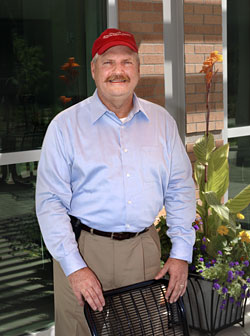Inside Iowa State
Inside ArchivesSubmit newsSend news for Inside to inside@iastate.edu, or call (515) 294-7065. See publication dates, deadlines. About InsideInside Iowa State, a newspaper for faculty and staff, is published by the Office of University Relations. |
Oct. 20, 2006 Payne spreads the word about Extensionby Laura Sternweis, Extension Communications and Marketing 
Jack Payne It's been a long time since Jack Payne rode his quarter horse, Buddy Two Socks, from his 40-acre ranch along Utah's Forest Service Boundary to anywhere he wanted to go in those tens of thousands of acres of rangeland. These days he doesn't have much time to get away -- or a horse to ride. As the new vice president for extension and outreach, Payne drives a Ford Escape hybrid, with "Iowa State University" emblazoned on the doors, from his home in Ames' Old Town historic district to far-flung points across Iowa. The small, fuel-efficient SUV helps this ecologist support the environment as he meets with citizens to spread the word about Iowa State's land-grant mission and Extension's place in Iowa's future. Challenges in a changing societyPayne is making sure Iowans know that Extension is as relevant in the 21st century as it was in 1862, when the Morrill Act created the land-grant mission of teaching, research and extension. "The great contribution of Justin Morrill's vision for the land-grant university was not to create technical schools that addressed a specific challenge; it was to bring the power of the university to bear on whatever challenges lay before society," Payne said. Extension was created to finance agricultural and mechanical education and to assure that education would be available to those in all social classes. Although Extension's commitment to agriculture and natural resources remains strong, today's organization also serves Iowans with education for business and industry, community and economic development, families, 4-H youth development and continuing education. But not everyone understands that, Payne said. "The crux of the Extension challenge is that we need to get to a place where the world recognizes us as a fountain of knowledge that extends beyond cows and plows." A household wordLast spring he conducted a "listening tour" throughout the state to hear what Iowans had to say and to share that message. "Many people had wonderful things to say about our work," Payne said. "Some folks thought that we only did research. Others were learning about our programs for the first time or didn't realize the scope of our programs." The tour made one thing very clear, he said. "We need to do a better job in getting the word out about Extension. My priority is to make Extension a household word -- like 'iPod' or 'homeland security.'" He appreciates Iowa State's commitment to Extension. "There is leadership from the very top of the university for the land-grant mission," he said, "and ISU faculty understand the importance of Extension in getting their research to the public. For example, Robert Brown in mechanical engineering introduced himself and said, 'Jack, I need Extension to get the word spread about the bioeconomy.' He came to me; I didn't have to seek him out. "The bioeconomy and biofuels are generating an opportunity that could create a rural renaissance, and we're positioning Iowa companies to take advantage of it," Payne said. He noted that Extension's Center for Industrial Research and Service is working with Boone's Vibroacoustics Solutions Inc., a producer of agriculture-based lubricants; and Sho-Me Container, a corn-based plastic container producer in Grinnell. "Extension professionals are the 'solutions specialists' who have relevant, long-standing relationships with the communities they serve, and they will be the stars of higher education in the 21st century. Extension is still all about people and improving the quality of their lives," Payne said. Recruiting for Iowa StateAnother of Payne's goals is to make sure Iowans know -- whether in an Extension county office, campus center or 4-H club meeting -- that Extension is an entry to Iowa State University. "We have to make the connection so that our clients can make the connection and the Legislature makes that connection," he said. Payne said Extension already recruits students for Iowa State. Kids who participate in 4-H or after-school programs, high school students who connect through the Extension county office, as well as working adults who want to continue their education, all find their way to Iowa State through Extension. In addition, Payne said, "We'll be studying some mature organizations, such as the Chamber of Commerce, that have managed to stay on people's radar screens despite technological advances and globalization. We'll be taking a close look at our markets and examining where the greatest opportunities are -- to help move Extension forward." The house that Pammel builtIn making the move to ISU Extension and Ames, Payne gave up his horses, his ranch and his small herd of Angus cattle. But his five dogs came to Ames with him and his wife, Renee -- to the house that Iowa State professor Louis Pammel built in 1892. "Pammel helped create Iowa's state park system and was the first president of the Iowa State Board of Conservation. He was an ecologist," Payne said. With degrees in biology, fisheries and wildlife, Payne laughed, "I'm an ecologist, too. It seems fitting to live in his house!" But Pammel likely had better luck keeping a horse in town. |
Quote"The crux of the Extension challenge is that we need to get to a place where the world recognizes us as a fountain of knowledge that extends beyond cows and plows." Jack Payne, vice president for extension and outreach |